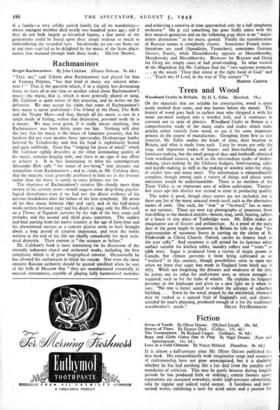Rachmaninov
Serge! Rachmaninov. By John Culshaw. (Dennis Dobson. Bs. 6d.) "TELL me," said Tolstoy after Rachmaninov had played for him at Yasnaya Polyana, " has that kind of music any interest what- ever ? " That is the question which, if in a slightly less. devastating form, we have all at one time or another asked about Rachmaninov's music—the music, that is, which is most generally played or sung. Mr. Culshaw is quite aware of this situation, and he writes on the defensive. We may accept his claim that some of Rachmaninov's best music is never performed—The Island of the Dead, The Bells and the Vesper Mass—and that, though all his music is cast in a single mode of feeling, within that distinctive, personal mode he is a master. We may even grant, if it really means anything, that Rachmaninov was born thirty years too late. Nothing will alter the fact that his music is the music of luxuriant passivity, that his fatalism did not even involve those spectacular, Henleyesque battles beloved by Tchaikovsky and that his head is ingloriously bowed and quite unbloody. Even that " longing for peace of mind," which Mr. Culshaw rightly describes as the other dominating quality of his music, remains longing only, and there is no sign of any effort to achieve it. It is this luxuriating in what his contemporary Alexander Blok calls " the ennui of not-being" that alienates our sympathies from Rachmaninov ; and to claim, as Mr. Culshaw does, that the neurotic traits generally attributed to him arc in the listener rather than the music is surely to carry defence too far.
The shortness of Rachmaninov's creative life—hardly more than twenty of his seventy years—would suggest some deep-lying psycho- logical disturbance even if we had not the direct evidence of his nervous breakdown after the failure of the first symphony. He wrote all his best music between 1897 and 1917, and of the half-dozen works written between 1917 and his death in 1943 only the Rhcvsody on a Theme of Paganini survives by the side of the best songs and preludes and the second and third piano concertos. The sudden and final parting from his native country at the age of forty-four and his phenomenal success as a concert pianist seem to have brought about a long period of creative impotence, and even the works written at the end of his life are chiefly remarkable for their tech- nical dexterity. Their content is "the mixture as before."
Mr. Culshaw's book is most interesting for its discussion of the virtually unknown choral and orchestral works, including the first symphony which is of great biographical interest. Occasionally he has allowed his enthusiasm to blind his reason. Not even the most eminent Russian authority should be quoted unedited when he says of the bells of Moscow that " they are manufactured essentially as musical instruments, capable of playing fully harmonised melodies and achieving a sonority of tone approached only by a full symphony orchestra." On p. 122 something has gone badly amiss with the first musical quotation and on the following page there is no "major- minor alternation " in the music quoted. Finally the transliteration of Russian names is completely chaotic. Sometimes French trans- literations are used (Apoukhtin, Tyoutchev), sometimes German (Sverev, Foeth), while Merezhkovsky appears as Mereshkovsky, Merejkovsky and Merejhkovsky. Bryossov for Bryusov and Greig for Grieg arc simply cases of bad proof-reading. In what version of the Magnifica! did Mr. Culshaw find the " two supreme moments . at the words 'Thou that sittest at the right hand of God ' and ... 'Teach me, 0 Lord, in the way of Thy statutes' "?
MARTIN COOPER.


































 Previous page
Previous page